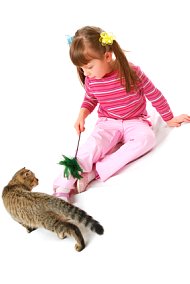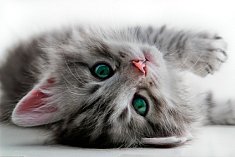|
Feline Obesity: Causes And Prevention

Veterinarians deal with feline obesity more often than any other cat health issue. Within the last couple of years there has been a significant increase in overweight cats, which has lead to the rise of diabetes, liver and heart disease. By being aware of the causes and ways to prevent obesity in cats, and working on keeping your cat from putting on unnecessary extra pounds, you can help your cat live a healthy, fulfilling life.
Causes
Feline obesity is caused by three major issues, which are; excessive caloric intake, lack of exercise and certain types of untreated diseases. Feline obesity plays a major role in the onset of some serious cat health problems such as; arthritis, diabetes in cats, liver disease, feline kidney disease and heart disease.
Excessive Caloric Intake
Cats are just like humans in regards to the fact that if they eat more calories than they use for energy, they will gain weight. For humans with a little math and information we are able to calculate the exact amount of calories we need daily to prevent weight gain, with cats one of the ways to know how much calories they need is based on their weight and age. On each bag of cat food there's usually, haven't seen one that doesn't have it, a label that states how much to feed your cat based on their weight. Younger cats require more caloric intake than adults, due to both their activity level and the fact that their growing. Kittens should be feed three to four meals per day, meanwhile adult cats can have two to three meals, most vets recommend two, however we feed our cats three servings of wet food per day, based on their weight, and they are both lean and healthy. If your cat is overweight your vet will recommended that instead of feeding your cat an amount based on a unhealthy weight, that you reduced the serving size to help your cat drop those extra pounds.
Lack of Exercise
Lack of exercise is a big concern and a contributing factor to feline obesity. Cats in the wild get their daily dose of exercise from chasing and catching their prey, this helps to keep their bodies lean and healthy. In order to keep out domesticated cats just as healthy, we need to engage them in play that requires them to run and jump. There are many toys that you can buy or even make that will encourage your cat to mimic hunting, such as; the laser light, remote control mouse, and even toys birds that chirp. As cats age, they become less mobile, and may lose interest in running, climbing and jumping, play sessions are still very important to senior cats, however you may need to have shorter sessions and play with toys that only require running and chasing, instead of jumping or climbing. There are so many benefits to exercising for your cats, it helps to burn calories, increases muscle mass and strength, and improves your cat's temperament. Increasing muscle mass is especially important because it will raise your cat's metabolism, allowing your cat to burn even more calories in a shorter amount of time.
Medical Conditions
Medical conditions such as arthritis, hypothyroidism and Cushing’s disease may cause your cat to put on extra pounds which may eventually lead to feline obesity. Arthritis causes discomfort and pain in your cat's joints which limits their mobility, and may make it painful for your cat to exercise. This lack of exercise and minimal movement, without any reduction in calories can cause weight gain. Hypothyroidism, although rare in cats, contributes to feline obesity as a result of the thyroid gland not producing enough thyroid hormones; the lack of enough thyroid hormones causes the metabolism to slow down, which leads to weight gain. Cushing's syndrome causes your cat's adrenal glands to produce too much cortisol, which can cause fat to build up in the abdominal area, upper back and face. Medications may also be required in order to manage arthritis and hypothyroidism, but in more advanced cases, surgery is also an option. For cats with Cushing’s syndrome, they may need to be taken off any medications containing steroids, as this can cause the condition, they may also require surgery to remove the adrenal glands. Weight gain is usually a symptom of these illnesses and requires treatment of the disease and sometimes a change in your cat's caloric intake, based on your vet’s recommendation, to help your cat get to and remain at a healthy weight.
Prevention
Like many other conditions, prevention is key. If you see your cat putting on unhealthy weight, discuss options with your veterinarian. A diet change may be recommended, or the answer could be as simple as increasing your cat's activity level. It is important to seek the advice of your veterinarian before placing your cat on any type of restrictive diet.

Increasing Exercise
Exercise is essential for any cat to keep them healthy and reduce their risk of feline obesity. Your cat should be getting at least 60 to 90 minutes of exercise a day, through play and the use of toys that gets them to run, jump and use up their energy to combat the onset of feline obesity. Entice your cat to exercise by introducing new toys often, or getting down on the floor and playing with them daily. Try making some fun and new homemade cat toys to keep them entertained and make up new games. Playing with your cat daily will help to build muscle and keep those extra pounds away. To find out how to make some fun easy to make homemade cat toys read Easy To Make Safe Homemade Cat Toys.
Feeding Premium, High-Protein Diet
A poor diet that consists of cheap low quality cat food can easily lead to feline obesity. Although low quality cat food hurts your wallet less than premium cat food, It is high in carbohydrates, full of fillers and may be detrimental to your cat's health.To find out more on how to choose the healthiest dry food for your cat read Dry Cat Food: How To Choose The Healthiest One For Your Feline Friend.
Cats are carnivores, when they are given low quality food that doesn't have the quantity or quality of protein they need to feel satisfied, they overeat. The best diet for your cat is a grain-free, premium high protein cat food that provides with all the energy and vitamins they need so that they are ready to run, jump and play.
Set Specific Meal Times
It's important to have meal times for your cats. Even when our cats were kittens we established set meal times, four times per day. We would leave a small amount of grain free premium hard food out for them to nibble on, but they rarely ate it and were always ready for their meals. Some cats are nibblers, especially kittens, and may not eat much in one feeding, so they may require an extra meal or two. Free feeding can sometimes lead to weight gain, especially if your cat is eating low quality hard food all day, that is a recipe for an increase in extra pounds which can eventually cause feline obesity. Depending on your work schedule, feeding your cat a meal before work, after work and before bed, and leaving a small amount of healthy premium cat food our for your cat to nibble on meanwhile your at work, is a healthy way to establish set meal times. Try to feed your cat at the same time every day,cats are animals who love routine and consistency, once you get your cat on set meal times, they will be the ones that arrive first in the kitchen waiting for you.
Limit Treats
Every cat loves treats; they will literally jump over every chair running as fast as they can once they hear that bag shaking or smell their favourite treat. Although treats can be a nice way to reward your cat it's important to feed your cat healthy treats in limited amounts. Healthy treats are treats that are not filled with fillers but offer nutrients and vitamins meanwhile still being a snack your cat loves. Freeze dried treats are a great example, they are simple protein that have been frozen, no fillers added. To find out more about how to choose a healthy cat treat read How To Choose Healthy Cat Treats.
However, even with healthy snacks it should only be given as an occasional treat, calories easily add up when cats are eating their regular meals plus additional snacks and can seaily lead to feline obesity. Keeping your cat at a healthy weight requires a combination of premium high protein cat food, annual checkups to make sure your cat is healthy and daily exercise through play.
Similar Topics
How To Treat And Prevent Worms In Cats - Discussing worms in cats treatment options and prevention.
Feline Lymphoma: Causes, Symptoms, Treatment - Discussing the causes, symptoms and treatment of feline lymphoma
Common Elderly Cat Health Problems - Examining several different health problems that affect senior cats and treatment options.
Feline Constipation: Causes, Symptoms And Treatment Options -Feline constipation can be both uncomfortable and painful for your cats, read to find out causes, symptoms and different treatment options.
Return From Feline Obesity To Cat Health Home Page
|
Protect Your Pet Card
In Case Of An Emergency The Protect Your Pet Card Lets Emergency Services Know That You Have Pet/Pets Waiting For You At Home, Making Sure That Your Pets Are Cared For.
Get Your Card Today!
Win A Free $250 Petsmart Gift Card For Your Cat!
Must Be A US Resident
Click Here To Easily Enter For Your Chance To Win.

"There are few things in life more heartwarming than to be welcomed by a cat."






